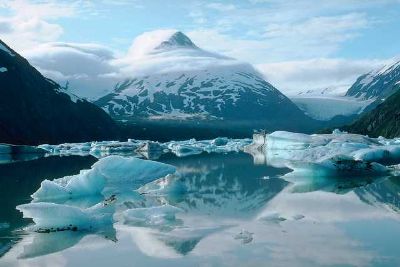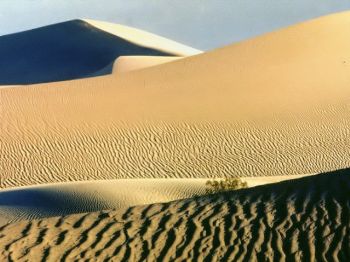by Larry
November, 2004Rapid Climate ChangeWhat do Antarctica, the U.S. Midwest, Greenland, Europe, Siberia, and North Africa have in common? Well, probably several things but what I have in mind is that they all share evidence of rapid climate shift. Such quick changes, fortunately, do not occur with the overwhelming speed and scope indicated by disaster movies such as "The Day After Tomorrow," unless there is a major new event, like a great collision with the planet, a massive, caldera-creating eruption, or a rupture in a natural barrier, suddenly releasing millions of tons of backed up water at once. Barring those sorts of geological catastrophes or, now that humanity has become so clever, a nuclear winter, climate change, even if abrupt compared with that with which we're familiar, should not be ushering in either a new ice age or a Hades hot oven baking of the planet's surface in only a month or two or, probably, even in our natural lifetimes. On the other hand, because many stable patterns in nature depend on the maintenance of fairly delicate balances, small, incremental changes can result in rather large, rapid consequences which then may be persistent until there is yet a new rebalancing.
One can think of models for this, to represent what may be occurring on a much more vast scale. For instance, if one is sliding, there is a fairly exact distance that one may safely slip when walking (averaging only about 1½ inches), or hydroplane at a certain speed while driving, without losing control and falling or crashing. Beyond that threshold, an accident is almost inevitable. With climate change today, we may be approaching the limits of some crucial thresholds.
In another example, when an iceberg is melting irregularly, either due to warmer air plus solar radiation above or warmer waters below, it will maintain its existing configuration with seemingly great stability up to a point, but then will swiftly rebalance and radically shift on one of its potential axes, often upending. For birds or mammals on the iceberg or close to it when this happens, the change could appear to occur quite rapidly, for no reason, and without the animals being able to safely adjust. A beaker of warm water will keep an amazing amount of water soluble chemicals suspended in solution. But at some point it becomes saturated. Then, adding just a bit more of the chemical or reducing the temperature a little can result in it dramatically precipitating out. Pilots and aeronautical engineers know that aircraft wings can sustain only a certain amount of wing icing and still have sufficient lift for the planes to remain in the air. The change from air worthy to plummeting may come gradually, but at some point a small amount of extra ice makes the crucial difference. Climatologists have found abundant evidence in ice cores, such as those from research in Greenland or Antarctica (some more than a mile long, providing climate data for the past 110,000 years), of numerous quick changes in earth's (relatively) recent past, when natural climate-related thresholds have been crossed. These have not necessarily brought full-fledged ice ages or hell on earth heating, but often have involved radical transformations that would have been extreme for many of the animals and plants affected. For instance, average temperatures have sometimes dropped 6°C and then remained at the new, lowered average level for hundreds or even thousands of years, so that what are now Europe and the eastern US have been plunged, in but a very few years, into a deep freeze more like Alaska's or Siberia's climate (used to be), with icebergs littering the ocean as far south as modern-day Portugal. In other instances, average temperatures have soared as much as 10°C in only a decade, the equivalent of Juneau and Moscow becoming as warm as Dallas and Rome. In our own history, the American Midwest became a dust bowl during the Great Depression after only a few years of drought. While we've become used to fairly benign weather conditions, in which humans have a fighting chance of succeeding in our encounters with the elements, if one of nature's vital thresholds is crossed, so that, for example, the monsoons no longer reliably come almost every year, the Atlantic cycle of currents ceases bringing warmer, salt-laden waters north (or this natural weather machine works a lot more slowly), the world's major grain belts cease receiving adequate rainfall, or the Pacific climate patterns shift just enough that its regions are subject to twice as many typhoons as they've tended to experience in the last several decades, the challenges to even our technologically advanced species would become intense.
Up till about 5000 years ago, what is now the Sahara was covered by forests, wide expanses of green growth, and lakes. The change was fairly sudden. Life for the people there before was surely much easier than for the fewer nomads who learned to adapt to the harsh desert environment into which humans were forced after that comparative Eden.
Nothing learned so far makes it inevitable we shall suffer from the crossing of a climate threshold and a consequent reordering of the many variables that make up our weather patterns. But with global warming having already begun, a substantial decrease in the earth's flora involved in regional weather (supporting more frequent local rainfall), a lowering of rivers' flow (as we use more fresh water for cities, industry, and agriculture), alteration of the atmosphere through greenhouse gases and pollutants, and decreased northern and southern oceans' salinity (from melting ice sheet and glacier runoff), the planetary climate balance is becoming more precarious. Avalanches around hunters in alpine areas are not a certainty, but when conditions are right avalanches do happen and may be started by but a single gunshot. Nor is there a guarantee that, if people begin now and work flat out to prepare for the rapid changes in our climate, we can reduce their severity or assure the survival of our nation or civilization, if one or more natural climate thresholds are crossed. But just as Winston Churchill urged planning for war during the rise to power of Adolf Hitler, though he could not be sure either that war would come or that Britain would be among its victors, so now we would seem to be in a far better position if we at least start such preparations than if we wait, as individual countries and as a global community, until a climate catastrophe is upon us.
Like Churchill, let us be both courageous and optimistic in facing up to the potential challenges involved before it is too late and a metaphorical iceberg of global climate change seeks a new balance, crosses a sensitive threshold, and tips us willy-nilly into an irreversible new world climate order.
Source: Abrupt Climate Change. Richard B. Alley in "Scientific American." Vol. 291, No. 5, pp. 62-69; November 2004. |

